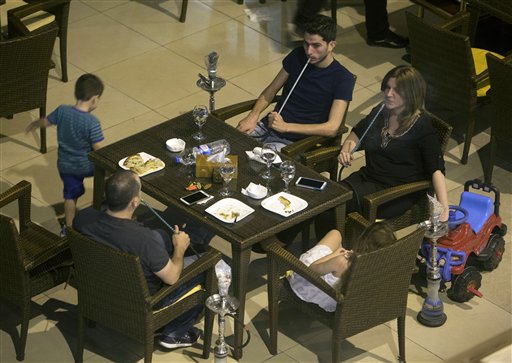GAZA CITY, Gaza Strip - After a ruinous war, Gaza is rushing back to a veneer of normalcy at astonishing speed. Street cafes and beaches are packed with people until late at night. Families crowd the few public parks. Wedding halls are booked solid.
Gazans who endured 50 days of devastating Israeli bombardment are now eager to enjoy some life. Far from a celebration, however, Gazans themselves acknowledge the revelry is only to thinly mask trauma and widespread despair.
Many complain that none of the gains they hoped for from the war have been realized. Almost none express any optimism for change in the misery in the tiny, densely populated Mediterranean coastal strip, which is suffocating under seven years of blockade by Israel and Egypt and is under the iron rule of the Hamas militant group.
"We go out just to steal a moment of joy," said Rami Ali, a 33-year-old bank employee sitting with friends at a seaside cafe. "We don't know what will happen tomorrow, we might have another war." He said nothing can help them avoid the reminders of the onslaught - "the destruction of homes, the power outages, the lack of any progress on easing the blockade."
The burst of liveliness is startling. Cafes on the streets or on Gaza's Mediterranean beaches are a main venue for nightlife, since under Hamas there are no cinemas or theaters. In the three weeks since fighting ended, coffeehouses have thronged with men, women and families. Commercial streets are choked with shoppers.
The Hamas government appears to have been caught off guard. Last week, authorities banned street parties, saying it was acting out of respect for the families of the dead. That put an end to bachelor celebrations traditionally held in the streets ahead of weddings - but not other forms of nightlife.
"It's like the war never happened, like a mental black hole swallowed it," Asmaa al-Ghoul, a prominent Gaza columnist, said of the determination to have some fun. "People are refusing to be crushed and insisting on living life to the fullest. Maybe that is what it's like to be a Gazan."
Al-Ghoul lost nine family members in an Israeli airstrike Aug. 3 that targeted their home in the southern city of Rafah.
The war was the longest and deadliest of three Hamas-Israel wars in less than six years. More than 2,000 Palestinians, including 500 children, were killed, 11,000 wounded and close to 100,000 made homeless, out of a population of 1.8 million.
Entire blocks were flattened. Some 50 families were wiped out, with at least 300 women killed, and up to 1,500 children were orphaned, according to Mona al-Shawa of the Palestinian Center for Human Rights.
"We are a people with an exceptional ability to endure, but the most painful thing is the feeling that you are living in an oppressive world and no one is taking your side," al-Shawa said. "What defines being a Gazan is the feeling of oppression."
Seventy-two people were killed on the Israeli side, including six civilians, in a war that erupted on July 8 when Israel launched a massive aerial bombardment of Gaza in response to heavy rocket fire by Hamas and other Gaza militants.
Even amid the rush for enjoyment, Gazans grimly note that none of Hamas' stated objectives - lifting the blockade and allowing the opening of an airport and a sea port - was achieved. The only positive outcome was that Israel extended the limit for fisherman to operate off Gaza's shores from three miles to six miles, bringing greater hauls of seafood in the markets.
That has fueled a lot of dark humor. Many joke that Gaza fought the war so it could eat fish again. Some ask ironically for "six-mile fish" at markets and eateries. Others ask for the "fruits of war" - a pun on the Arabic word for seafood, "fruits of the sea."
"We need to fight another war to double the distance to 12 miles," quipped Gad Bakr, a 37-year-old trawler skipper, after a nighttime fishing trip this week.
Israel unilaterally withdrew from Gaza in 2005 but still retains tight controls over its air, sea and land. It and Egypt have sharply restricted movement of people and goods in and out of the territory since Hamas seized control of Gaza in 2007.
Beyond the economic hardship, Hamas has run Gaza with an iron fist, tolerating little or no dissent and weighing heavily on people's lives with an overwhelming narrative of religious piety and resistance against Israel.
Its security agents are so omnipresent people nickname them the "ground drones" - a play on the Israeli drones that often hover over Gaza. Hamas at times intervenes to separate mixed-gender activities among young people or to halt cultural programs it deems immoral or influenced by the West. Most main squares are adorned with giant billboards extolling jihad against Israel.
Akram Moussa, a Gaza psychiatrist, says the festivities are masking the acute trauma he sees in his patients since the war's end. "They are in denial," he said of merry-makers. "It will go and be replaced by anger first and then grief."
Mahmoud Daher, director of the U.N. World Health Organization's office in Gaza, says he has seen a rise in domestic violence, which he attributes to the sense of frustration.
"There may not be a single Palestinian in Gaza who thinks the future will be brighter," he said.

